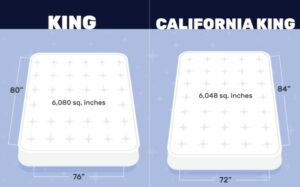Introduction:
Selecting the right mattress can be a weighty decision, especially considering the pounds involved. A king-size mattress, known for its luxurious spaciousness, averages between 130 and 180 pounds—a significant factor when planning your purchase.
This article illuminates the factors affecting mattress weight and provides practical insights to help you understand what you’re lifting into your bedroom. Dive into our guide and lift the veil on mattress weights.
Table of Contents
Key Takeaways
- King-size mattresses weigh between 130 and 180 pounds on average, with the heavier ones often made of materials like memory foam or latex.
- The weight of a mattress can impact its transportation and setup, so it’s important to plan accordingly and possibly enlist help when moving it.
- Over time, mattresses may gain weight from dust mites, skin cells, and moisture accumulation, making regular cleaning and maintenance essential.
Understanding Mattress Weight
The weight of a mattress is influenced by several factors, including the materials used, the size of the mattress, and the type of construction. Understanding these factors can help homeowners make informed decisions when shopping for a new mattress.
Factors that influence weight
Mattress weight is crucial to your comfort and the ease of handling your bed. Various factors can significantly affect how much your king-size mattress weighs.
- Materials used: Mattresses crafted from dense memory foam or thick latex tend to be heavier than those made with light materials, such as fiberfill or low-density foam.
- Construction Type: An innerspring mattress might have a different weight compared to a solid foam mattress due to the metal coils within it.
- Layers and density: More layers and higher-density foams add to the overall weight of a king-size mattress, making them thicker and heavier.
- Mattress thickness: A thicker profile often means more material is used, increasing mattress weight.
- Added features: Mattresses with extra features like pillow tops or cooling gel layers can be weightier than standard ones.
- Age of the mattress: Over time, mattresses can accumulate moisture and dust, potentially making them heavier than when they were new.
- Bedding accessories: Foundations, box springs, or adjustable bases paired with a king-size mattress contribute to the total weight you’ll need to consider for transport and setup.
- Covering materials: Heavy-duty fabric covers or those with added quilting also affect how much a king-size mattress weighs.
Importance of mattress weight
Considering the weight of a king-size mattress is crucial for various reasons. A heavier mattress signifies robust materials and durability, ensuring your bed withstands years of use without losing comfort or support.
For homeowners, taking into account the weight can also aid in anticipating the ease or difficulty of moving and setting up your new sleeping hub. King mattresses that tip scales between 130 and 180 pounds might require extra hands during transport and positioning.
Heavy mattresses pose challenges but bring benefits like reduced motion transfer providing sound sleep even if your partner tosses and turns. They typically offer thicker padding and more substantial support layers, improving the overall sleep experience.
Selecting a king-size bed with a suitable weight impacts immediate convenience during setup and long-term satisfaction with its performance as you cozy up night after night.
Average Mattress Weights by Size
The weight of a mattress varies depending on its size, with twin and twin XL mattresses typically being lighter than full, queen, king, or California king mattresses. Understanding the average weight of different mattress sizes can help homeowners make informed decisions when purchasing a new mattress for their home.
Twin and Twin XL
Twin-size mattresses are lighter and easier to move, weighing about 40 to 45 pounds. They’re an excellent choice for children’s rooms or smaller bedrooms with limited space.
A Twin XL mattress, slightly longer than a twin, typically weighs a little more—around 43 to 48 pounds. These extra inches provide additional legroom for taller individuals without taking up the width of larger mattress sizes.
Opting for a Twin or Twin XL allows homeowners to enjoy comfort without the hassle of maneuvering a heavy mattress through tight spaces. Due to their reduced weight, these mattresses also make frequent bedding changes or room rearrangements less daunting tasks.
As they accommodate different body types and bedroom dimensions, these sizes balance practicality and personal comfort.
This information will help you know ‘how much does a twin mattress weigh?’

Full
The weight of a full-size mattress typically ranges from 50 to 100 pounds, making it lighter than larger sizes such as queen or king. This makes it more manageable for transportation and maneuverability, especially if homeowners need to move or reposition the mattress within their homes.
The average thickness of a full-size mattress is about 8-12 inches, contributing to its relatively lighter weight compared to larger sizes like king or California king mattresses.
Innerspring and memory foam are common materials used in full-size mattresses, with memory foam mattresses generally weighing slightly more due to the density of the foam. Despite being lighter than larger sizes, homeowners should still consider the weight when setting up their full-size mattresses and ensure they have adequate support for the entire structure. This information will help you learn ‘how heavy is a full size mattress?’
Queen
When it comes to mattress weight, the average queen-size mattress falls between 50 and 100 pounds, making it lighter than king-size mattresses. The weight of a queen-size mattress is influenced by factors such as materials used and type, with memory foam and latex mattresses tending to be on the heavier side compared to other types.
A queen-size mattress also offers comfortable sleeping space for couples while being more accessible to transport and maneuver than larger sizes.
King
A king-size mattress weighs between 130 and 180 pounds on average, making it one of the heaviest mattress sizes available. The weight of a king-size mattress can be attributed to its larger dimensions and greater sleeping space, which provide ample comfort for couples.
The materials used to construct the mattress, such as memory foam or latex, can also influence its weight. Kings are significantly heavier than other sizes, like twin or full mattresses, due to their increased surface area and corresponding materials.
The weight of a king-size mattress is an essential consideration when moving or transporting it within the home. Furthermore, understanding how different materials impact weight allows homeowners to decide which type of king-size mattress best suits their needs and preferences.

California King
Moving from the standard king-size mattress to a California king introduces a change in dimensions and weight. While the length increases, often requiring extra space, the weight range remains similar at 130 to 180 pounds.
These unique dimensions and comparable weights make the California King an attractive option for those seeking a longer mattress without a substantial increase in weight.
The distinct feature of increased length rather than width provides added comfort for taller individuals while maintaining manageable weight when it comes time to move or maneuver the mattress within your home.
Average Mattress Weights by Type
The weight of a mattress can vary depending on its type, such as innerspring, memory foam, latex, hybrid, or adjustable firmness. Each type’s unique composition and materials contribute to its overall weight.
Understanding the average weights of these different types can help homeowners make informed decisions when choosing a mattress for their needs.
Innerspring
Innerspring mattresses typically weigh between 60 and 100 pounds for a king-size. The weight largely depends on the number and quality of coils used in the construction and the additional layers of foam or padding.
Unlike other types, such as memory foam or latex, innerspring mattresses tend to be lighter due to their coil-based structure.
The average weight of an innerspring mattress is influenced by its size and can range from around 45 pounds for a twin size up to approximately 95 pounds for a full size. Additionally, it’s essential to consider these mattresses’ support and durability when evaluating their weight.
Memory Foam
Memory foam mattresses are known for their unique ability to contour to the body, providing personalized comfort and support. However, this advanced technology comes with a trade-off in weight.
On average, memory foam king-size mattresses weigh between 130 and 180 pounds, making them heavier than other mattresses. The density and thickness of the memory foam layers add to the overall weight, offering superior pressure relief but requiring more effort when moving or maneuvering.
When considering a memory foam mattress for your home, it’s essential to consider its weight for transportation and setup purposes. Additionally, the longevity and durability of a memory foam mattress can be influenced by its weight over time.
Therefore, homeowners should carefully assess these factors before choosing a memory foam mattress. These factors will help you know ‘how much does a memory foam mattress weigh?’
Latex
Latex mattresses, known for their resilience and support, are typically heavier than other types due to the dense latex foam used in their construction. The weight of a latex king-size mattress can range from 130 to 180 pounds, making it essential to consider transportation and setup logistics before purchasing one.
Due to its durability and excellent support, a latex mattress is often favored by individuals seeking long-term comfort and relief from pressure points.
The weight of a mattress plays a crucial role in determining ease of maneuverability and bed frame compatibility for homeowners. It’s important to note that while the weight of the mattress contributes to its sturdiness and stability, factors such as the thickness and density of the latex can also impact its overall heaviness.
Hybrid
Hybrid mattresses combine the support of innerspring coils with the contouring comfort of memory foam or latex. These mattresses typically weigh between 100 and 150 pounds for a king size, depending on the materials used in their construction.
The combination of materials adds to the weight and provides a balanced feel that can suit a wide range of sleepers, offering both support and pressure relief.
The hybrid design incorporates various layers contributing to its weight, such as pocketed coils for support and multiple foam layers for cushioning. Due to its layered construction, this blend results in a durable and supportive mattress that often weighs more than other types.
Adjustable Firmness
Adjustable firmness mattresses provide the flexibility to customize the feel of the bed according to personal preferences. Homeowners can fine-tune the level of support and comfort by adjusting the firmness settings, ensuring a tailored sleeping experience that suits their needs.
These mattresses typically incorporate air or foam chambers that can be inflated or deflated to achieve desired firmness levels, allowing for versatile customization.
Utilizing advanced technology, adjustable firmness mattresses offer an innovative solution for couples with varying sleep preferences. With separate controls for each side of the bed, individuals can independently adjust their preferred level of firmness without compromising on overall mattress support.
How Much Does a King-Size Mattress Weigh?
When it comes to king-size mattresses, various factors can affect the overall weight. Factors such as mattress type, materials used, and additional features can all play a role in determining the weight of a king-size mattress.
Considering these factors is important when choosing a mattress for your home.
Factors that affect weight
Factors that affect the weight of a king-size mattress can vary based on several key factors. These include the materials used, such as memory foam or innerspring, and the mattress’s age. The dimensions and construction also play a significant role in determining the overall weight of a king-size mattress.
- Type of Materials: The materials used to construct the mattress, such as memory foam, latex, or innerspring, can significantly impact its weight. Due to their density and composition, memory foam and latex mattresses are generally heavier than traditional innerspring mattresses.
- Dimensions and Construction: The size and dimensions of a king-size mattress contribute to its overall weight. With larger dimensions than other standard mattress sizes, a king-size mattress naturally weighs more due to the increased material required for its construction.
- Age: The age of a mattress can influence its weight over time. Factors such as wear and tear, moisture retention, and accumulation of dust mites can cause an increase in weight over the mattress’s lifespan.
- Additional Features: Some king-size mattresses may include additional features such as pillow tops or extra layers for added comfort or support, which can also increase overall weight.
Comparison chart of mattress weights
Homeowners looking to purchase a king-size mattress often considers the weight of the mattress as a key factor, especially for transportation and setup. The following chart provides a comparative overview of average mattress weights across different sizes and types, enabling homeowners to make an informed decision.
| Mattress Size | Innerspring | Memory Foam | Latex | Hybrid | Adjustable Firmness |
| Twin | 40-50 lbs | 45-55 lbs | 50-60 lbs | 50-70 lbs | 70-90 lbs |
| Twin XL | 43-53 lbs | 50-60 lbs | 55-65 lbs | 60-80 lbs | 80-100 lbs |
| Full | 50-60 lbs | 55-65 lbs | 60-70 lbs | 70-90 lbs | 90-110 lbs |
| Queen | 120-160 lbs | 130-150 lbs | 140-160 lbs | 150-170 lbs | 150-180 lbs |
| King | 130-160 lbs | 140-180 lbs | 150-190 lbs | 160-200 lbs | 170-230 lbs |
| California King | 130-160 lbs | 140-180 lbs | 150-190 lbs | 160-200 lbs | 170-230 lbs |
The chart highlights the heavier nature of king-size mattresses compared to smaller sizes, with memory foam and latex types weighing more due to their dense materials. Homeowners must also consider how mattress weight affects setup, maneuverability, and long-term use. Moving to the next topic, we will delve into the specifics of a king-size mattress’s weight and the factors that affect it.
Do mattresses gain weight over time?
Over time, mattresses can accumulate weight due to dust mites, skin cells, and moisture collection. These factors contribute to an increase in overall mattress weight over the years.
Additionally, the natural breakdown of materials like foam or fibers may add to the weight gain of a mattress as it ages. Homeowners should consider regular cleaning and maintenance to minimize this buildup and uphold hygiene standards for their mattresses.
To prevent excessive weight gain in mattresses over time, homeowners can utilize mattress protectors or covers designed specifically to repel dust mites, allergens, and moisture.
These protective layers act as a barrier against these elements, ensuring the mattress remains clean and hygienic for longer periods while reducing any potential additional weight gain associated with debris accumulation.
Important Considerations for Mattress Weight
Consideration of the weight of a mattress is important for transportation, setup, and maneuverability. It also impacts durability and can affect comfort and support.
Transportation
Transporting a king-size mattress requires careful planning and consideration due to its weight and size. Here are some important factors to consider:
- Check the dimensions of any doorways, hallways, or stairwells the mattress must pass. Measure these areas to ensure the mattress will fit without difficulty.
- Secure proper lifting assistance if needed, as king-size mattresses can be heavy and difficult to maneuver alone. Enlist help from family members or friends for safe handling.
- Use protective covers or bags designed for mattresses to keep them clean and protected during transit, especially if moving in inclement weather or over long distances.
- Ensure that the vehicle, whether a moving truck or a personal vehicle, has ample space to accommodate the mattress without causing damage to walls or other items.
- Use appropriate tie-down straps or restraints to secure the mattress during transport, preventing shifting and potential damage.
- Drive cautiously if transporting a mattress on top of a car, ensuring it is well-secured with ropes or straps at multiple points around the perimeter.
- Consider hiring professional movers with experience handling large mattresses if navigating tight spaces or dealing with complex transportation logistics.
- When possible, disassemble bed frames and remove any obstacles in transporting the mattress to streamline the process and reduce potential hazards during movement.
- Double-check all securing mechanisms before leaving on the journey to avoid unexpected issues.
Setup and maneuverability
Setting up and moving a king-size mattress can be challenging due to its weight. Homeowners should consider the following factors for easy setup and maneuverability:
- Enlist help from others to lift and position the mattress, especially if it’s a memory foam or latex type that tends to be heavier.
- Utilize a sturdy bed frame with proper support to ensure the mattress is secure and easier to move during cleaning or rearranging.
- Opt for a mattress with built-in handles, making it easier to grip and maneuver when rotating or adjusting its position.
- Use furniture sliders under the bed legs to facilitate smooth movement across floors when relocating the mattress within the room.
- Consider investing in a lightweight but durable platform bed frame that simplifies moving and setting up the king-size mattress.
- Choose a location for the mattress that provides ample space for maneuvering, especially through doorways and tight corners during installation or repositioning.
Durability
The durability of a king-size mattress is closely linked to its weight. Heavier mattresses are more durable, as they often contain higher quality materials and construction that can withstand wear and tear over time.
A durable mattress is essential for maintaining comfort and support, ensuring it remains in good condition for many years. When considering the weight of a king-size mattress, homeowners should also factor in its durability to make a well-informed decision about their investment.
In addition to weight, other factors, such as material composition and construction, contribute to the durability of a king-size mattress. These aspects determine how well the mattress will hold up under regular use.
Understanding these factors is vital for homeowners who seek long-lasting comfort and support from their king-size mattress.
Comfort and support
Considering comfort and support is crucial when choosing a king-size mattress. The weight of the mattress can impact its level of support, with heavier mattresses generally providing better support.
Additionally, the materials used in the mattress, such as memory foam or latex, can influence its comfort level. It’s essential to assess comfort and support based on personal preferences and any specific physical needs individuals may have for a good night’s sleep.
How much does a queen-size mattress weigh?
A queen-size mattress typically weighs between 50 and 100 pounds, with variations based on the material and construction. Factors such as memory foam or hybrid design can influence weight and mattress age.
This makes it a manageable option for homeowners in terms of transportation and setup while offering ample sleeping space. Understanding a new mattress’s weight can help ensure a smooth purchasing and delivery process.
Conclusion
In conclusion, the weight of a king-size mattress typically ranges from 130 to 180 pounds. Factors such as material type, age, and size influence its weight. Memory foam and latex mattresses generally weigh more compared to innerspring ones.
It’s essential to consider these factors when choosing a mattress for transportation or setup. Understanding how much a king-size mattress weighs provides valuable insight into its practical implications for homeowners.
Frequently Asked Questions
How heavy is a king-size mattress?
A typical king-size mattress weighs between 90 to 150 pounds.
Can one person lift a king-size mattress?
One person can lift a king-size mattress, but it may be easier with two people due to its weight and bulkiness.
Do I need special equipment to move a king-size mattress?
You may use moving straps or ask for assistance from another person when moving a king-size mattress.
Will the weight of the king-size mattress affect my bed frame?
The weight of the mattress could potentially affect your bed frame, especially if it's not designed to support heavier mattresses.
Are there any lightweight options for king-size mattresses?
Some manufacturers offer lightweight materials in their mattresses but might have different characteristics than traditional models.










